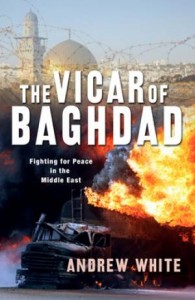Contemporary Church History Quarterly
Volume 18, Number 4 (December 2012)
Review of Andrew White, The Vicar of Baghdad: Fighting for Peace in the Middle East (Oxford and Grand Rapids, MI: Monarch Books, 2009) 191 Pp., ISBN: 9781854248763.
By John S. Conway, University of British Columbia
 Andrew White is an Anglican priest who was posted in 2005 to St George’s Parish in Baghdad, which must be physically the most dangerous, and possibly spiritually the most challenging of all Anglican parishes anywhere. This short and vivid autobiographical account of his ministry there is a witness to a costly Christian discipleship of notable significance, and throws light on a unique segment of contemporary church history.
Andrew White is an Anglican priest who was posted in 2005 to St George’s Parish in Baghdad, which must be physically the most dangerous, and possibly spiritually the most challenging of all Anglican parishes anywhere. This short and vivid autobiographical account of his ministry there is a witness to a costly Christian discipleship of notable significance, and throws light on a unique segment of contemporary church history.
White is clearly a man of extraordinary energy and perseverance, having a capacity for friendship with a remarkable range of Middle East religious leaders, who have assisted him in his self-appointed task of implementing a new climate for peace and reconciliation in this very troubled region. His interest in the Middle East began when he was still an ordinand at Ridley College, Cambridge, a conservative evangelical college. But he was encouraged to spend part of his final year of training in Jerusalem, studying both at the Hebrew University and at a yeshiva. At the same time he got to know several Islamic leaders in the city. While still a curate or junior vicar in south London, he managed to pay numerous visits back to the Holy Land, and even to report his findings to Pope John Paul II. In 1998 he was appointed Director of the International Centre for Reconciliation at Coventry Cathedral, and became involved in such episodes as the 39-day siege of the Church of the Holy Nativity in Bethlehem in 2002. The intensive negotiations between the insurgents who had seized the church, the Christian authorities and the Israeli security forces, taught him many lessons about high-level diplomacy in extreme situations and the church’s role in finding solutions. In 2005 he was posted to Baghdad. His church building, as the only Anglican parish in Iraq, had been built in the 1920s when the British Empire still ruled. But under Saddam Hussein it had been shut down. Anglicans were a vanishing breed. But White has successfully rebuilt a congregation of local people with evangelical-style services in Arabic and even Aramaic, though he requires the services of a translator for his sermons.
White’s principal task, as his subtitle indicates, is to try and promote peace and reconciliation in the region, for which he obviously has a considerable flair. The politicians, generals and diplomats who have ruled Iraq since Saddam’s overthrow have tended to discount or underestimate the importance of religion, but White firmly believes in its centrality, if any discussions with the main actors of Iraqi society are to be successful. In his view, an understanding of, and approach to, the leading figures in the religious sphere, including the militant Muslims, is a vital first step. These are the men who promote conflict in the belief that they are defending their holy traditions and culture. But White seeks to recruit the support of other religious leaders who recognize the need for a more peaceful future. He has therefore energetically sought to enlist the help of both Shia and Sunni clerics to support his Foundation for Relief and Reconciliation in the Middle East. He believes that religious extremists can only be approached by those who address them in religious language, so he has worked tirelessly to maintain communication between the various factions in the religious establishment both in Iraq and outside in order to promote dialogue and find consensus. But he has no illusions that progress towards a peaceful resolution will be agonizingly slow in an area continually fuelled by religious antagonisms, and may even be overtaken by the forces of violence, as is obvious in Syria today. This is a highly dangerous ministry. White has to have a permanent bodyguard in a city where all foreigners are at risk. Front-line peacemaking can be immensely stressful. At one point in 2007 he was obliged to flee the country, but later was able to return to take up his mission again. Several of his colleagues have been captured and held to ransom. Some have never been seen again. So this account can only be an interim report on a brave attempt to overcome the mutual incomprehension between the Islamic world and the West, which White sees as one of humanity’s biggest problems today.
